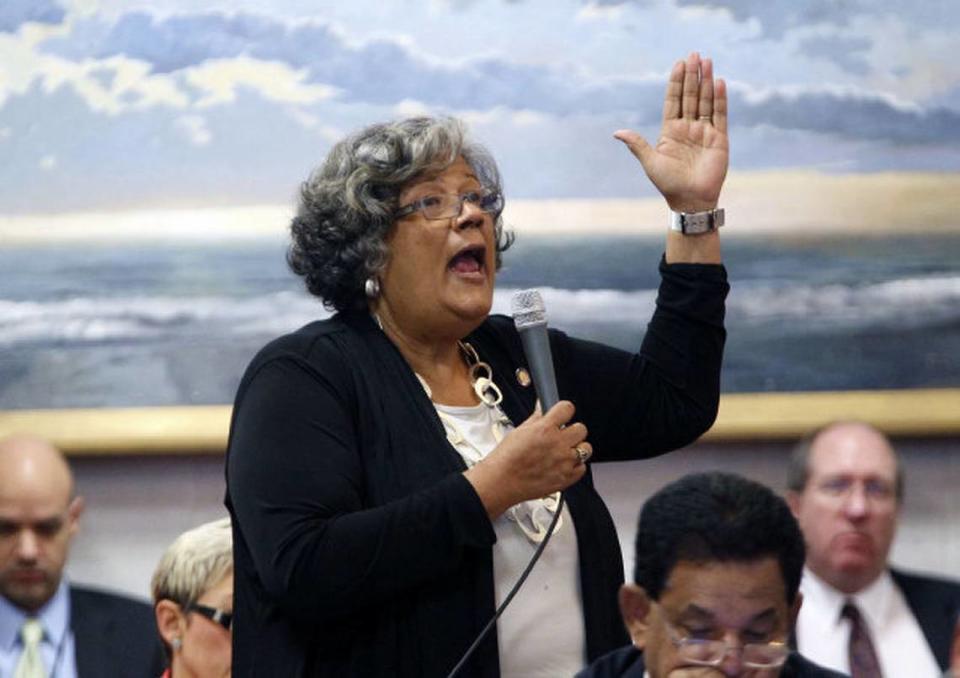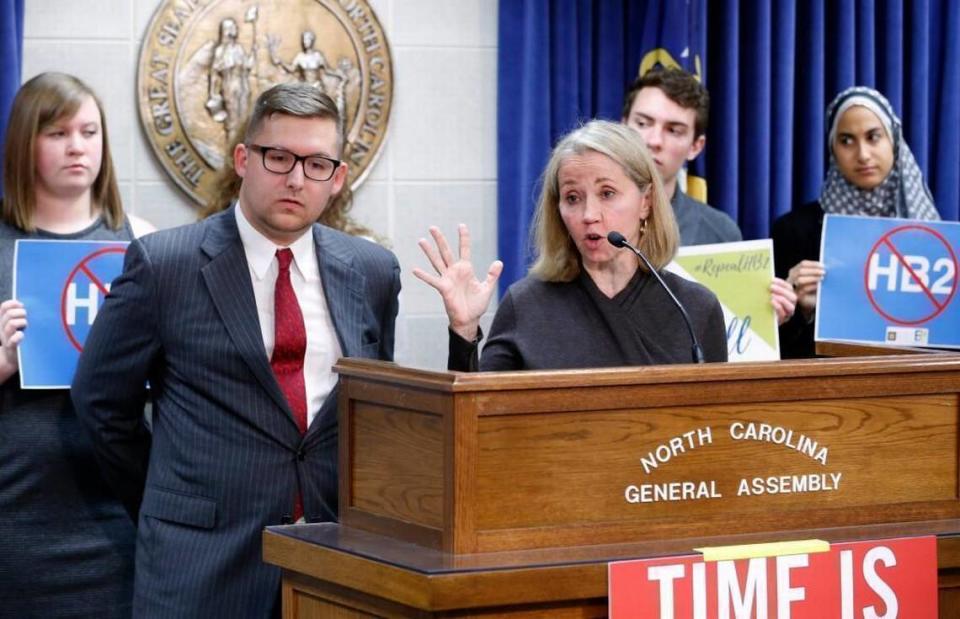Democrats will soon know if they’ll vote again for Lt Gov. These are their options.
Democratic voters will have to wait a few more days to find out if there will be a special runoff election for lieutenant governor.
State Rep. Yvonne Lewis Holley of Wake County received 26% of votes on the March 3 primary election, with state Sen. Terry Van Duyn of Asheville coming in second with 20%. Holley would have needed more than 30% of votes to win outright. But a runoff isn’t automatic — the second place vote-getter has to request it. Van Duyn told The News & Observer on Friday that she would make her decision on Tuesday.
“I want that seat to be blue, and I’ve got to figure out what’s the best course. And I’m just not there yet,” Van Duyn said in a phone interview from Asheville.
If she requests a runoff, the second primary election is likely to be May 12.
Regardless of whether there is a runoff, a woman will be the Democrat on ballots this fall for lieutenant governor.
If Holley is the nominee, the next lieutenant governor of North Carolina will be African American — no matter who wins in November — a first for the state.
The Republican lieutenant governor nominee will be Mark Robinson, a Greensboro gun rights activist, who is black. Robinson won the nine-way Republican primary outright with 32% of votes.
The Democratic candidates
Van Duyn had the most money of the candidates during the primary, raising $489,000 in individual contributions and another $5,900 from PACs including Lillian’s List and the Sierra Club. Her campaign spent much of it on television advertisements and direct mail. Her donors include a range of educators, retirees and others.
Holley, a retired state employee, raised about $38,000. Her individual donors include educators, other retired state employees, professors, attorneys, House Minority Leader Darren Jackson, several other Democratic House members and Wake County School Board member Chris Heagarty.
The State Employees Association of North Carolina hasn’t endorsed a candidate for lieutenant governor. SEANC’s only endorsement in North Carolina’s Council of State races for the March 3 primary was for incumbent Treasurer Dale Folwell, who was unopposed in the Republican primary.
Holley said she has grassroots support.
During the primary campaign, she told The N&O in an interview that she’s running for lieutenant governor for several reasons.
“Some of it was I’ve been in the General Assembly and fighting for things in the General Assembly, and given the Republican dominated [majority] we been able to get limited things through,” she said. Holley’s priorities include addressing food deserts and housing affordability. Her “Affordable Living Initiative” plan would bring more people to the table, she said.
“I’m not really running to be something, I’m running to do something,” Holley said.
Holley said that women have historically not been on the “political forefront” and that women elected officials bring a “different perspective to the table.”
“A woman who’s been a mother to several children knows how to feed all the children, and when one is sick to give them the attention and still give attention to her other children,” Holley said.
Post-primary, both Holley and Van Duyn talked about the importance of trying to take back the majority of the legislature from Republicans, who now control both chambers.
In a statement on Wednesday, Holley called for party unity and not a runoff:
“I look forward to leading the North Carolina Democratic ticket with Governor Cooper in November. I call on all of my recent Democratic opponents to join me in unity so that we can win back the General Assembly this fall. I am ready to start fundraising for the general election and ignite the progressive base of the Democratic party,” Holley said in the statement. “I am looking forward to instituting my Affordable Living Initiative (ALI) to help all North Carolinians. Now that I have proven I can build a broad coalition of supporters from across the state; it is time to unite everyone together to bring this home in November!”

Van Duyn said Friday she has a long list of phone calls to make before making her decision on Tuesday.
“My objective is to do what’s best to make sure we have a Democrat in that seat. I think it’s really likely we could have a tied Senate after the 2020 election, and I want to make sure that any tie votes are broken in favor of Governor Cooper’s vision for North Carolina. I really admire what he’s trying to do, I want to him to have a very successful second term,” Van Duyn said.
Van Duyn said her priorities as lieutenant governor would be education funding and health care, including Medicaid expansion. She said that working previously as an Affordable Care Act navigator, she saw people’s health-care needs firsthand, and access to health care has become a passion for her.
“The other thing is, my son’s autism was diagnosed by his third grade teacher. That was 30 years ago, and so I owe a huge debt to teachers in North Carolina. They changed our life after doctors couldn’t figure out what was going on with him,” she said.
Van Duyn has served more than three terms in the Senate. She was the primary sponsor for bills in the 2019 session including driver’s license restoration for those who have completed DWI court treatment, calling for the adoption of the Equal Rights Amendment and making the general Election Day a state holiday.
Holley is in her fourth term in the House and is vice chair of the House Regulatory Reform Committee. Bills she was the primary sponsor for during the 2019 legislative session include a Retail Workers’ Bill of Rights, Southeast Raleigh YMCA funds and staggering terms of Wake County Commissioners.

Unsuccessful primary candidate and state Rep. Chaz Beasley raised about $163,000 from individuals and another $5,300 from PACs. Beasley tweeted his support of fellow House member Holley and said he does not want a runoff.
“Before I knew the outcome, I believed that a runoff could be potentially detrimental to our party’s chances of winning the Lieutenant Governor’s position in the general election — a position that is more impactful than many believe,” Beasley tweeted.
Beasley and candidate Allen Thomas both received 19% of the Democratic primary vote. Thomas has endorsed Holley and asked that there be no runoff. Candidates Bill Toole and Ron Newton, who each received less than 10% of votes, have also since endorsed her, the campaign announced.
The North Carolina Democratic Party does not make endorsements in primary races.
“I’ve spent six years in the General Assembly to build my caucus to make sure we are relevant. I see a place to take the majority again,” Van Duyn said Friday.
“I’m just focused on what it takes to turn the lieutenant governor’s position blue, so that Roy Cooper has an excellence partner to move to the state forward. I’m a believer,” she said. “We can’t do the job we were elected to do unless we take the majority.”
What the LG does
The job of lieutenant governor comes with a six-figure salary — the same pay as eight other executive-branch positions that are likewise elected statewide and separately from the governor, collectively known as the Council of State. The lieutenant governor presides over the Senate but doesn’t make committee appointments or present bills. She or he can only vote in the Senate to break a tie.
It can be a stepping stone to the governor’s mansion, as it was for former Democratic Gov. Bev Perdue, but it comes with less power than legislators.
The lieutenant governor serves on the State Board of Education, N.C. Board of Community Colleges, State Economic Development Board and Military Affairs Commission.
The lieutenant governor and governor can be from different political parties; they do not run as a joint ticket.
Former Lt. Gov. Walter Dalton, a Democrat, said that “people perhaps overestimate the control or the power of the lieutenant governor, but it does give you somewhat of a bully pulpit. It’s not a megaphone but it’s a small microphone,” the N&O previously reported. “It’s really what you make it.”
For more North Carolina government and politics news, listen to the Domecast politics podcast from The News & Observer and the NC Insider. You can find it on Megaphone, Apple Podcasts, iHeartRadio, Stitcher or wherever you get your podcasts.

